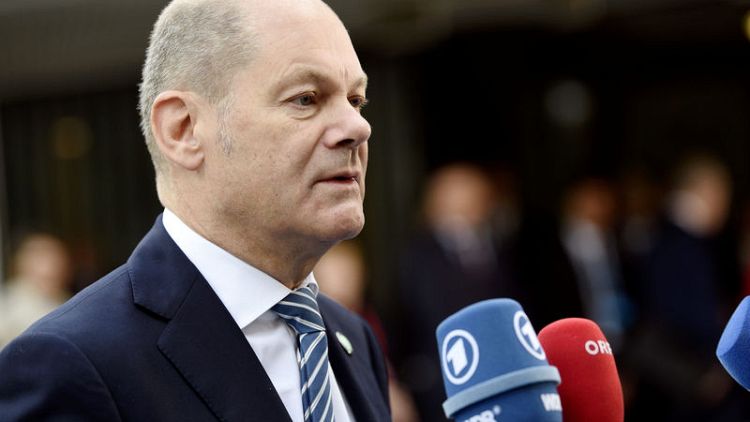BERLIN (Reuters) - Germany has enough options for funding a planned climate package and ditching its balanced-budget policy by taking on new debt should be a last resort, Finance Minister Olaf Scholz said on Monday.
Responding to voters' concerns about climate change, Chancellor Angela Merkel's ruling coalition wants to present plans on Friday to make the economy greener and put it on track to meet European Union emissions targets by 2030.
Scholz said the government would finance the measures with existing funds and new revenue streams expected to be generated under the fresh measures rather than abandon the balanced budget policy and go on a fiscal splurge.
"For me, we have sufficient options for action that we should first exhaust before such a discussion makes sense," Scholz told a news conference with other senior figures from his Social Democrats (SPD), junior partner in Merkel's coalition.
His remarks show how strong resistance remains within the coalition to abandoning the balanced budget despite pressure at home and abroad to support Europe's largest economy, on the brink of recession, by borrowing to boost public investment.
The climate package is expected to include measures such as extending grants for electric car buyers, expanding a network of charging stations, raising road taxes for polluting vehicles and improving heating systems for buildings.
A proposal by Merkel's conservatives envisages doubling the 7.38 euro levy on domestic flight tickets. Connecting flights for long-haul journeys would be excluded from the increase.
The coalition partners are divided on how to finance Germany's march towards a green future, with Merkel's conservatives cast as more eager to ensure that the burden of financing the measures does not hurt German industry. The SPD wants to protect low earners.
FUNDING OPTIONS
Another Social Democrat, budget policy expert Johannes Kahrs, earlier said the climate package would cost the government 4-5 billion euros per year initially. There was money in an energy and climate fund that could be used, he said.
"I think we can rearrange funds in the remainder of the budget so that we think we can start this without new taxes," Kahrs said.
Income would also come from whatever the coalition parties compromise on, be it an emissions certificate trading system or a CO2 tax.
"This must be integrated into this budget and then consolidated step-by-step, because you have to reconfigure the whole industrial landscape, the whole country, that could also be a big job driver and economic package," Kahrs said.
He said the state should help so that people on small and medium incomes or commuters would not face additional burdens but should instead get subsidies to buy new cars or switch their heating systems.
Sources said last week that a windfall of 5 billion euros or more this year from lower borrowing costs could help finance the climate package.
The climate protection measures the government wants to unveil on Friday will cost at least 40 billion euros until 2023, a person briefed on the talks told Reuters on Saturday.
Scholz said he wanted to increase taxes on domestic flights in a bid to tackle CO2 emissions, telling Bild in a video interview on the newspaper's website: "We have the ticket tax and we want to increase it for domestic flights."
(Reporting by Michelle Martin and Paul Carrel, Editing by Catherine Evans)
